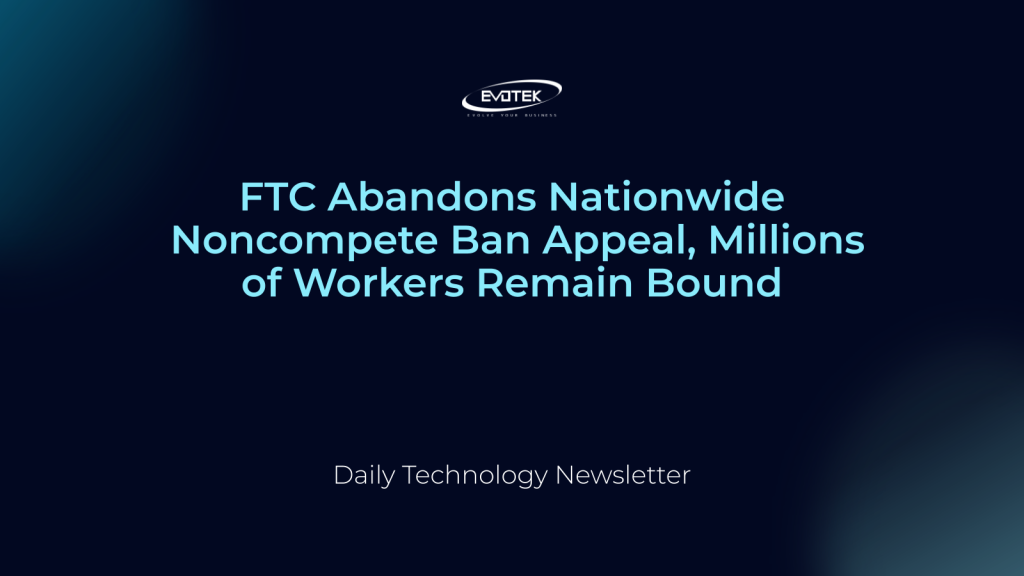The Federal Trade Commission (FTC) has officially ceased its efforts to implement a nationwide prohibition on employment noncompete agreements. This significant reversal marks the conclusion of a prominent regulatory initiative from the Biden administration. In a 3-1 vote on Friday, the agency decided to withdraw its appeal against a federal court’s decision that had previously blocked the ban, ensuring that noncompete clauses can continue to be widely utilized across the United States.
This critical decision by the FTC was made just before a looming court deadline. The Fifth Circuit Court of Appeals had granted multiple extensions following requests from the Trump administration, whose recently appointed FTC leadership indicated a disinclination to continue the legal defense of the ban. Ultimately, the commission confirmed its withdrawal from the legal battle.
“Illegality Was Patently Obvious” – FTC Chair Ferguson
FTC Chair Andrew Ferguson, in a joint statement with Commissioner Melissa Holyoak, asserted that “The rule’s illegality was patently obvious.” Ferguson contended that the proposed ban unlawfully superseded state-level contract laws, stating it “preempted the laws of all fifty States, and actively displaced hundreds of existing laws across forty-six States.”
Commissioner Rebecca Kelly Slaughter, currently the sole Democrat on the panel, cast the dissenting vote. Her return to the commission just last week followed a court ruling that reinstated her after an earlier attempt by the Trump administration to remove her.
The Original Ban and Its Ambitious Goals
The FTC initially finalized this noncompete ban in April 2024, during the tenure of then-Chair Lina Khan. This proposed rule aimed to nullify most existing noncompete agreements and prevent the formation of new ones, with only minor exceptions. Estimates from the commission at that time suggested that approximately 30 million Americans – representing roughly one in five workers, from hourly staff to corporate leaders – were subject to such restrictive clauses.
Supporters championed the rule as a crucial move to enhance worker mobility and elevate earning potential. Khan had projected that eliminating noncompetes could inject up to $300 billion annually into US wages and stimulate the launch of numerous new businesses. However, these anticipated benefits were never realized.
Ryan LLC, a Dallas-based tax services firm, promptly contested the rule, supported by the powerful US Chamber of Commerce. A federal judge in Texas ultimately sided with the challengers, determining that the FTC had overstepped its jurisdictional authority. This judicial intervention effectively halted the nationwide implementation of the ban before it could be enacted.
Shifting Towards Targeted Enforcement
From its inception, the rule faced strong opposition from those who argued the FTC lacked the mandate to enforce such a sweeping ban on employment practices. Ferguson himself, in a 2024 dissent, described it as “By far the most extraordinary assertion of authority in the Commission’s history,” cautioning that it breached constitutional boundaries.
Nevertheless, Ferguson has also conceded the potential harm of noncompete clauses. In his Friday statement, he noted, “They can be, and sometimes are, abused to the effect of severely inhibiting workers’ ability to make a living.” Under his leadership, the FTC is now pivoting towards a strategy of targeted enforcement, prioritizing agreements identified as anticompetitive under the Sherman Act over a blanket prohibition.
The agency recently demonstrated this new approach by compelling the nation’s largest pet cremation company to halt the enforcement of noncompete clauses against nearly 1,800 employees. Furthermore, the FTC is actively soliciting public input and information regarding the practical application of noncompete agreements, which will guide future enforcement strategies.
Critics and Business Interests Weigh In
Critics of the commission’s decision argue that a fragmented, case-by-case enforcement strategy cannot achieve the broad impact of a nationwide regulation. Commissioner Slaughter voiced her concern to NPR, stating, “It does nothing to help the person working at the hair salon in Minnesota, or the engineer in Florida, or the fast food worker in Washington. Those people deserve protection, too.”
Conversely, various business groups contend that noncompete restrictions are essential for safeguarding legitimate corporate interests. Ryan LLC, the original plaintiff, argued that the proposed ban would enable employees to move to rival companies, potentially carrying proprietary knowledge with them. The Chamber of Commerce further cautioned that the elimination of noncompetes could destabilize labor markets and diminish overall productivity.
For the foreseeable future, the commission is pursuing an alternative path. The proposed nationwide noncompete rule is slated to be vacated, meaning future scrutiny of such agreements will occur on an individual, case-by-case basis. What was initially presented as a comprehensive transformation of the employment sector has now transitioned into a more gradual, incremental approach to regulation.

 日本語
日本語 한국어
한국어 Tiếng Việt
Tiếng Việt 简体中文
简体中文